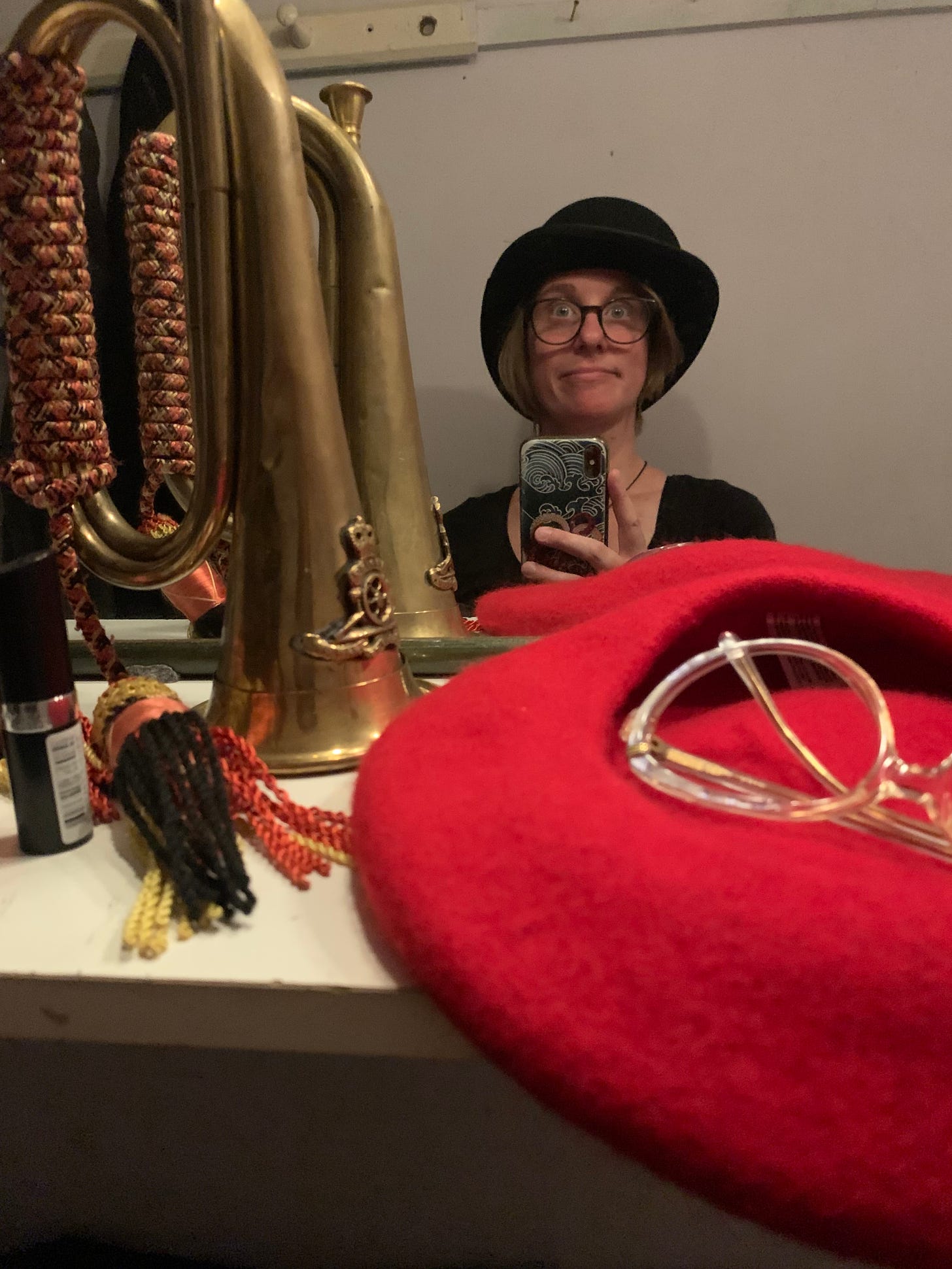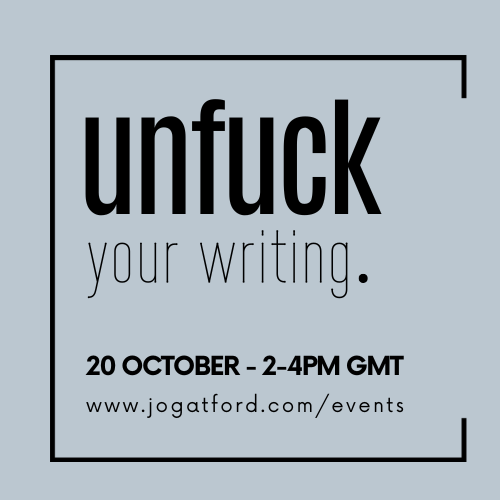Howdy, hi, hello, good day.
This month I have mostly been pacing backstage at my favourite tiny local theatre doing extremely important things like: opening doors on cue, safety-pinning ripped costumes, making tea, and torturing a gang of very sweet young actors with “that’s what she said” jokes. (It’s a problem. I know.)
In an intense scheduling juggling act that I probably didn’t really have time for, I agreed to help stage manage The Real Inspector Hound — a very silly Tom Stoppard farce — and wouldn’t ya know it, despite having nothing to do with the act of writing, the whole ridiculous experience also inspired my latest Fixion Lesson (and I think it’s a really important one).
But before we get into it, a brief intermission to remind you that I’m running a brand new online workshop on 20 October called Unfuck Your Writing, which will hopefully be the sweary antithesis to every hyper-productive / plot-by-numbers / “just-write-1000-words-every-morning-at-5am!” piece of writing advice you’ve ever heard (and let’s face it — there’s a lot of that shit about).
Instead, I wanna look at how we can unlearn potentially unhelpful creative habits, rediscover our naturally fluctuating creative cycles (no matter how feral or erratic they may be), and practice writing what feels right and true and exciting and JOYFUL.
Y'know, the way art is supposed to make us feel good and fulfilled and connected with this whole being a human thing? ‘Cause I dunno about you, but lately I’ve felt myself further and further away from that.
So, if that sounds like something you'd be into, find out more and grab yourself a ticket here:
And there’s definitely a general vibe of ‘unfuckery’ techniques in today’s post (to give you a sneak peek of what to expect from the workshop), so let’s get back to it:
Lessons from the (back)stage
Normally my theatre-related stuff is more to do with writing and directing, but a friend asked me to help out with the stage management side of his production, but since we are still in our YES era, and it sounded like a fun thing to do, I gave a resounding hell yeah and jumped on board.
And, for a manic six weeks, I got to watch a bunch of delightful actors bringing words and characters and absurdist jokes to life; I got to watch the director megamind all the moving parts to orchestrate what turned out to be a very complex show; and I got to brainstorm and learn a whole load of logistics with a wonderfully experienced and generous backstage crew.
It was manic and inspiring and exhausting and hilarious and also: endlessly repetitive.
In the course of rehearsing and dress-rehearsing and tech-rehearsing and then putting on the actual show for a week, I must have seen that play from start to finish at least a hundred times.
Which is how it’s supposed to be.
You don’t just dole out parts and scripts and props and costumes, stick everyone on a freshly-painted set and expect the whole thing to magically come together without a whole load of work and re-working and experimenting and problem solving and repeating and repeating and repeating and repeating.
Even when all the tickets had been sold and the audience’s bums were on the seats and the curtain opened, the play still got tweaked and adjusted, night after night; it still turned out slightly different, show after show. Things went wrong. Some audiences were raucous and some were quiet. Actors recapped their lines in between scenes. And together, we refined the whole process as smoothly as we could. But ultimately, it was an exercise in doing the same thing over and over again.
Which is kinda ridiculous, when you think about it. And also perhaps the point of it all.
Because I keep coming up against this massive dissonance between the way we approach writing and the way we approach pretty much every other form of artistic practice — this complete disregard for the importance of repetition.
Writing as rehearsal
Rehearsal, practice and repetition are integral aspects of most art forms — whether you’re making music, drawing, painting, crafting, sculpting, dancing, acting, or really any other kind of creative expression or performance.
There’s an assumption that a) it will take time to get whatever it is you’re creating to a decent standard, and that b) to get there, a huge amount of practice will inevitably be involved.
No one would begrudge a dancer for training the same move repeatedly, or a pianist for doing their scales over and over again, or an artist for filling a sketchbook with life drawing references, or an actor for running lines ad nauseum.
Rehearsal is worthwhile and vital to the process.
None of these creative pursuits are expected to be perfect or complete or even recognisable as the final version during the preparation period.
And there’s this unspoken understanding that within all these art forms, through the course of this practice, you never stop learning and improving and growing and developing and refining your art. You’re never expected to stop practising.
In fact, if you don’t keep up with this repetitive (and yes, sometimes frustrating and boring) approach, you’ll forget your lines, lose muscle memory, slow down, get a lil’ rusty. But that’s just how it works. We practise, practise, practise, and then we practise some more.
So…. spot the difference.
Most writers I know tend to focus on the end goal — the finished ‘product’ — much more than the process itself. They don’t tend to see drafting as rehearsal. They discount their daydreaming and doodling and brainstorming and outlining and freewriting and discarded scraps of writing as, well, nothing. They certainly don’t see the value in doing the same thing over and over again with no tangible outcome.
But how many words have you written that never saw the light of day?
Were they wasted? Were they pointless? Were you somehow supposed to just write the perfect version, right off the bat?
And if so, how then do you measure ‘progress’ in your writing?
Because I learned more from the novels that I’ve shelved and the projects I’ve abandoned and the drafts that stay unfinished and the iteration after iteration that came before a final version than I ever did on the super rare occasions where a story emerged fully formed.
The time I spend editing (my own and others’ work), re-reading, re-writing, repeating, rehearsing, practising with words, the better I become at noticing when I hit a bum note or get my lines wrong or miss the mark. I build muscle memory into my syntax and rhythm and pacing and tone and narrative structure. I keep that practice active instead of expecting it to spontaneously emerge, primed and ready, when I happen to call on it.
And holy smokes am I fully aware that this practice needs to continue on and on and on, over and over and over again, forever. Which is fucking marvellous, because that means there’s always more for me to learn and explore and improve upon.
Because rehearsal is worthwhile and vital.
I wasn’t even in the theatre show and I ended up knowing most of the lines by heart. I knew all the cues. I knew which props everyone needed. What costumes they wore. Which parts the audience would laugh at. I saw that silly little play a hundred times and it still felt like a fresh piece of art each performance.
So next time you’re sitting down to write — no matter what the hell you’re writing; no matter how crappy it is; or whether you discard it the minute you’re done with it — remind yourself that this is just rehearsal. And you are just practising your art.
And that’s the fucking point.
Unfuck your writing workshop — 20 October
If any of this is making sense to you, then you might also wanna take part in what I’m affectionately calling The Great Unfuckening on 20 October, because this kind of perspective shifting approach is exactly what my Unfuck Your Writing workshop is all about.
It’s not that we’re doing things wrong. It’s not that we’re irrevocably stuck. It’s not that we’re broken. It’s not that we’re terrible at writing. It’s just that perhaps our views and attitudes towards creativity are, well, a little bit fucked.
But maybe it’ll actually only take a small shuffle or a jiggle or a tweak or a pivot or a good ol’ reliable primal scream to look at things a different way.
And maybe there is a different way to practice your creativity — to follow the flow instead of forcing it; to listen to your weird artistic impulses instead of trying to please some imaginary future audience; to unlearn the shit that shuts you down and re-engage with what makes writing exciting and joyful.
Huh. Imagine that.
Join me in The Great Unfuckening and let’s figure out what works for you.
A reminder that all The Joy of Fixion posts are currently freeeeee to read but you are more than welcome to pay for them if you so wish — either by subscribing monthly or annually, or becoming a founding member:
Or by tossing a few pennies in my busking hat:
Thanks for reading.
And happy writing rehearsing.






